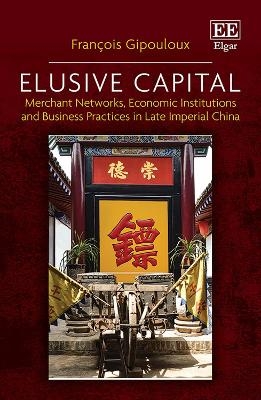
Elusive Capital
Merchant Networks, Economic Institutions and Business Practices in Late Imperial China
Seiten
2022
Edward Elgar Publishing Ltd (Verlag)
978-1-80088-989-7 (ISBN)
Edward Elgar Publishing Ltd (Verlag)
978-1-80088-989-7 (ISBN)
Offering a fresh analysis of late imperial China, this cutting-edge book revisits the roles played by merchant networks, economic institutions, and business practices in the divergence between Europe and China during the trade revolution.
Focusing on the operating modes of three major regional trading networks active in Fujian, Huizhou, and Shanxi from the sixteenth to the nineteenth centuries, François Gipouloux assesses the driving forces behind their dynamism, the role they played in Chinese economic development, and the constraints in which they were embedded. Examining merchants’ business practices, partnerships,and investment strategies, chapters portray the three central figures of China’s economy – the financier, the middleman, and the business entrepreneur – and their complex relationships with the imperial bureaucracy. By analysing the divergent trajectory of seemingly identical institutions in China and Europe, Elusive Capital takes a comparative approach to shed light on the factors that inhibited the transformation of commercial development into an industrial revolution, ultimately discovering why capital accumulation proved so elusive in late imperial China.
Revealing novel insights from primary documentation including trial accounts, Elusive Capital will prove an invigorating read for students and scholars of economic history, business studies, and Asian urban and regional studies
Focusing on the operating modes of three major regional trading networks active in Fujian, Huizhou, and Shanxi from the sixteenth to the nineteenth centuries, François Gipouloux assesses the driving forces behind their dynamism, the role they played in Chinese economic development, and the constraints in which they were embedded. Examining merchants’ business practices, partnerships,and investment strategies, chapters portray the three central figures of China’s economy – the financier, the middleman, and the business entrepreneur – and their complex relationships with the imperial bureaucracy. By analysing the divergent trajectory of seemingly identical institutions in China and Europe, Elusive Capital takes a comparative approach to shed light on the factors that inhibited the transformation of commercial development into an industrial revolution, ultimately discovering why capital accumulation proved so elusive in late imperial China.
Revealing novel insights from primary documentation including trial accounts, Elusive Capital will prove an invigorating read for students and scholars of economic history, business studies, and Asian urban and regional studies
François Gipouloux, Emeritus Research Director, Centre National de la Recherche Scientifique, École des Hautes Études en Sciences Sociales, Paris, France
Contents: 1. Introduction: comparative economic history and the trajectory of economic institutions 2. The city and the merchant 3. Regional merchant networks 4. The figure of the intermediary: brokers, merchant manufacturers and guilds 5. Ultra-marine trade: forms, structures and actors 6. Partnerships, company, contracts and risk management in overseas trade 7. Capital mobilization, human capital development and shareholding 8. The elusive capital 9. The decline of regional merchant networks 10. Conclusion: fragile prosperity and the matter of divergence Bibliography Index
| Erscheinungsdatum | 10.06.2022 |
|---|---|
| Verlagsort | Cheltenham |
| Sprache | englisch |
| Maße | 156 x 234 mm |
| Themenwelt | Geschichte ► Teilgebiete der Geschichte ► Wirtschaftsgeschichte |
| Sozialwissenschaften ► Soziologie ► Spezielle Soziologien | |
| ISBN-10 | 1-80088-989-5 / 1800889895 |
| ISBN-13 | 978-1-80088-989-7 / 9781800889897 |
| Zustand | Neuware |
| Haben Sie eine Frage zum Produkt? |
Mehr entdecken
aus dem Bereich
aus dem Bereich
die Ukraine, Polen und der Irrweg in der russischen Geschichte
Buch | Hardcover (2023)
C.H.Beck (Verlag)
28,00 €


